Risks
now browsing by tag
On Distance, Longing, and Losing Myself

 A couple of weeks ago, in the midst of a mission about visibility, I let myself get lost.
A couple of weeks ago, in the midst of a mission about visibility, I let myself get lost.
Attending the regional conference for my profession, I reconnected with friends, attended a few panels and meetings, and then promptly let myself be lured away from the crowds, choosing a quiet beer with a few friends over the conference reception. Since I hadn’t seen these particular friends in at least three – four years, and this was the longest amount of time we’d all spent in the same place, I reasoned that this still counted as visibility. The next day I attended sessions, continued to meet with friends, and generally let myself follow my permission slip to be in the moment and accept the adventures that came to me.
I forget, sometimes, how powerful the permission slip can be. These days there is nearly always one in my pocket when I have one, tucked into my bra when I don’t. A mix of the things I most need reminding of, the messages vary and either wouldn’t make sense to anyone else or might seem banal: belong to myself, own my authority, be in the moment, shine, be rooted. Often I forget about them entirely until one slips out of my pocket when I reach for my lipstick or flutters to the ground as I get ready for bed in the evening. Permissions slips were certainly not on my mind when my friend and I entered our hotel bar that evening, which probably explains why I was ready and a little surprised at the adventure which followed. Picking up a guy in the hotel bar is probably about as banal as you can get for a somewhat newly divorced woman, so I won’t bore you with all the details. The only important elements were that it was fun for me, it counts as visibility, and as you can expect from me I’ve analyzed it all for every possible meaning and lesson. Don’t worry, I won’t bore you with all of those either.
Spring Break came this week, just in time. Reading Rebecca Solnit’s A Field Guide to Getting Lost seemed like a good start for a week in which I wanted to step away from all the pressure and exhaustion of this first year.
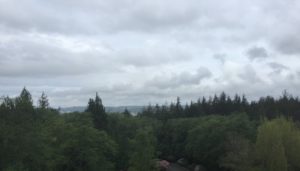
Solnit opens with a discussion of losing yourself, of the possibilities of an open door, and follows it up meditating on the blue of distance and longing. In the course of our evening, Magnum P.I. (as Dr. Mags dubbed him)asked me what I wanted. Inspired by the near anonymity of it all and the knowledge that I would never see him again, I surprised myself and told him. “As an academic, I want someone or something that shuts my brain off.” No, I wasn’t very articulate, but I’d had a couple of glasses of wine and it was the best that I could do to describe it. The permission slips might tell me it is okay to be in the moment, to accept the adventures, but they don’t turn off the constant assessing and analyzing, or the anxieties that come with it.
As she often does, Solnit seems to articulate my feelings better than I can. What I tried to describe to Magnum was the way I want to stop the assessing, the analyzing and truly lose myself in a moment. Solnit describes it:
To lose yourself: a voluptuous surrender, lost in your arms, lost to the world, utterly immersed in what is present so that its surroundings fade away. In Bejamin’s terms, to be lost is to be fully present, and to be fully present is to be capable of being in uncertainty and mystery. And one does not get lost but loses oneself, with the implication that it is a conscious choice, a chosen surrender, a psychic state achievable through geography.
Solnit and Benjamin are referring to losing yourself in your surroundings, whether city or country, hence the reference to geography. For me, right now, I am caught longing for the choice, for the ability to lose myself, that feels so far out of my grasp. I try. I walk around the lake to visit the heron. I pause on my bridge to feel the breeze, to watch the water ripple, to lose myself in that moment. I am stuck in the longing though, wanting to choose the surrender, but always too aware. Discussing longing and the blue of distant horizons, Solnit asks, “If you can look across the distance without wanting to close it up, if you can own your longing in the same way that you own the beauty of that blue that can never be possessed?”
Crossing the distance 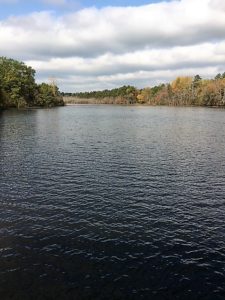 the blue we longed to find recedes to the next horizon, the thing or feeling we long to possess shifts and changes when we acquire it. Perhaps losing myself is a choice I make or not, but maybe it isn’t a choice that can be made in the moment. Yes, as I described I analyzed every moment from my night at the bar. I assessed and learned my lessons, hopefully. My brain worked and worked for the whole drive home. As I described my deepest longing to a stranger, though, I didn’t recognize that in a way I’d already gotten there. I was wholly there, in that moment, in the uncertainty and mystery of getting to know someone, of not knowing where the night would take me. My longing for someone or something to shut my brain off remained the beautiful blue of the far horizon; maybe, it, like that blue, is even something that can never be possessed. That night though, I was fully present and my brain was off; maybe that is how I can own my longing, learn to recognize how it can be fulfilled by my immediate surroundings.
the blue we longed to find recedes to the next horizon, the thing or feeling we long to possess shifts and changes when we acquire it. Perhaps losing myself is a choice I make or not, but maybe it isn’t a choice that can be made in the moment. Yes, as I described I analyzed every moment from my night at the bar. I assessed and learned my lessons, hopefully. My brain worked and worked for the whole drive home. As I described my deepest longing to a stranger, though, I didn’t recognize that in a way I’d already gotten there. I was wholly there, in that moment, in the uncertainty and mystery of getting to know someone, of not knowing where the night would take me. My longing for someone or something to shut my brain off remained the beautiful blue of the far horizon; maybe, it, like that blue, is even something that can never be possessed. That night though, I was fully present and my brain was off; maybe that is how I can own my longing, learn to recognize how it can be fulfilled by my immediate surroundings.
Preparations
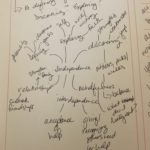
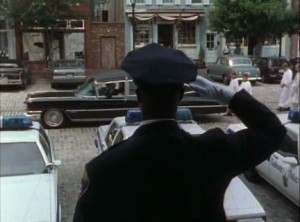 It feels like 2016 has been a year of goodbyes and endings: David Bowie, Prince, George Michael, the Obama presidency, etc. Writing a eulogy for the year would seem appropriate. Frankly though, I do not have the heart or stomach for the retrospective. My heart and mind are thoroughly engaged in considering the year ahead.
It feels like 2016 has been a year of goodbyes and endings: David Bowie, Prince, George Michael, the Obama presidency, etc. Writing a eulogy for the year would seem appropriate. Frankly though, I do not have the heart or stomach for the retrospective. My heart and mind are thoroughly engaged in considering the year ahead.
As I have posted before, each year I choose a word or theme to guide me, 2016’s word was Stewardship. Many times this year it felt like a poorly chosen word, but in the end I think I can see it in my life. While I thought I would use this year to be a good steward of my finances, health, and relationships, the year drug me kicking and screaming into being a steward of myself. It taught me to sit with my emotions, name them, and truly feel them. It forced me to have the courage to listen to my gut, and sometimes the best stewardship is to let something go.
This morning I sat down to brainstorm my theme and word for 2017. You can see my brainstorming starts at a particular place, independence.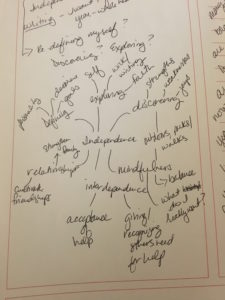 The word isn’t just a goal I have or a place I want to be. Independence is my state of being. It is where I “Stewarded” myself in 2016.
The word isn’t just a goal I have or a place I want to be. Independence is my state of being. It is where I “Stewarded” myself in 2016.
As I mentioned before, much of what happened this year is, and is not, my story to tell. The consequence of those events though, that is definitely mine to tell, painfully mine to tell. In 2016, I divorced the DH. As with the whole of our marriage, it was fated – full of signs and wonders, quick, and complicated. I’m pretty sure that describes all marriages, but the DH and I have always prided ourselves on our story. The story of our marriage ended this year. The story of my independence began.
This year, 2017, this will be my year of discovery. Discovering who I am, where I want to go, and who I will be. More than vulnerability, more than visibility, more than any of the other words I’ve chosen to guide me over the years, discovery challenges me and frightens me. There is no way to know what lies on the other side of discovery, no way to prepare for it, and that is a vulnerable place for me to be.
I won’t make any promises about how often I will post, or what the content of those posts will be. What I will say is this: Discovery requires exploration, and exploration requires documentation, so maybe there is hope for rejuvenating this space after all.
Risks and Rewards
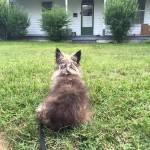
I didn’t set out for this to be a year of saying yes to everything that scares me, but I have intentionally, unintentionally, and somewhat haphazardly taken some big and small risks this year. Since I spent last week, as Dr. Brene Brown describes it using the Franklin Delano Roosevelt quotation, face down in the arena, I’ve spent this week trying to take stock, figure out what got me there, and how to get back up. Fortunately for me, the universe sent along a few reminders. 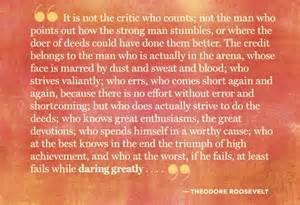
Though I find the “just get through it” mentality generally serves me well. One of the downfalls of this mentality is that sometimes I get so busy “getting through it” that the things I need to process, and actually deal with, tend to stack up.
As someone surrounded by friends and family who face daunting struggles with depression, I consider myself blessed that my own bouts of depression tend to be short-lived, and in some ways purposeful. Sometimes it takes me a while to figure it out, but generally if I am feeling depressed it is a sign that in “just getting through” stuff, I’ve also let things pile up. So, last week when I reached a particularly low point, I knew that part of the process of getting back up would have to be taking stock of things and figuring out how to deal with them.
Please, don’t run screaming, this is not going to be a post where I give you a three step process for solving all my (and/or your) problems. This post is more about identifying the things, taking risks, and their rewards. If you want to run screaming from that, well, now is the time; and, it won’t hurt my feelings if you do.
For me, getting through things often means narrowing my focus and concentrating on putting one foot in front of the other. This a great strategy for the day to day, for things like being fully back in the class room for the first time in five years, or for immersing myself in a sub-field I’ve only dabbled in before, or for re-adapting to life in a smaller, more isolated community. The problem with this narrow focus is it means that when I do stumble I lack the perspective to help me recover. Since I have always managed the day to day stuff fairly successfully, it is natural for me to be hard on myself when I start not coping well with the day to day.
It takes time for me to see the forest for the trees, to fully accept that three and a half months ago my office looked like this: 
that I said good bye to that place, the people I worked with, and my friends: 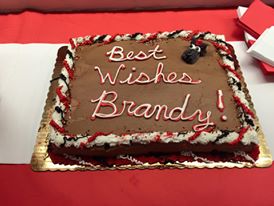
that I packed up the DH, the dogs, and said goodbye to this town, the people, and this old house: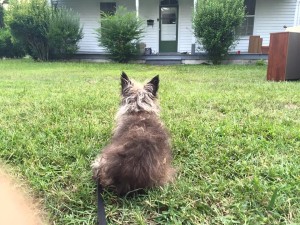 .
.
I did all of that to take a job I’d applied for in April, and interviewed at in May. A job that carries a similar title and some similar day to day work, but that in reality has vastly different expectations. Basically in about 8 months I changed nearly everything about my day to day life. Yet, my day to day, get through it, coping strategy doesn’t really account for that. Basically, it tells me, “You did this to yourself. Now, suck it up and get going.”
As my last post revealed, it is hard enough for me to admit I miss the people and community I had, I haven’t even started to think about how I miss my standing desk and dual monitor set up, the window in my office, the restaurants I could walk to for lunch. All of those things I know are affecting me physically and emotionally, yet I’m not taking the time to consider them. Really, I am actively berating myself for not dealing better. (Yeah, I know … that is some logic there.) As silly as it sounds, this week I’ve been thinking about / accepting that this move, this new job, this new life they all constitute a very big risk I have taken. Funny, it wasn’t until last week when I felt completely flat on my face that I realized I was even in the arena in a very big way.
Actually, it was a combination of feeling completely defeated, and taking smaller risks that helped me to better accept the big risk I have taken, and to be kinder to myself in this struggle. Last week, I sent a draft of an article to a colleague at another institution. It doesn’t sound like much of a risk, but this is the first time I’ve shared my work outside of my friends and graduate school co-hort. (No, the dissertation does not count, and why is a different discussion.) This colleague graduated from a more prestigious university than I did. She is insanely smart, and I feel like I work to keep up with her in conversation. Though I knew it would ultimately help me, I worried about sharing this not quite first draft with her. It felt like showing my warts. I was worried she would tear my work apart, and that she would be right in doing so. Of course, I didn’t share any of this with her, so today when I received her feedback it felt like a gift. She praised and loved parts of my article, and she gave me wonderful feedback and tips on the other parts … the parts I knew needed more attention. My reward for this risk isn’t the praise an positive feedback she gave; my reward is that she pushed in all the places I knew I needed pushing. She confirmed my own instincts about my writing. Right now, for me, this is a win, and a small risk that I hope will lead to bigger ones.
This is getting long, I know, but just one more thing. The other risk I took this week is having my faculty mentor, who is from the professional education department, observe my class. Being back in the classroom this year has left me all kinds of vulnerable, but this last couple of weeks I have really been feeling it. Listening to other people in the department talk about their composition classes, it’s become clear to me that I have a very different pedagogy, and structure my class quite differently. The most obvious way I have done that is by making my class read, think, and talk about race. (I did mention that I moved North of North, right?) Since they are all working on their own topics and projects, we needed an example to talk about in class, so I structured a series of readings focused on race in America, which started with whiteness and ended with Rachel Dolezal.
Whenever I talked about the readings and discussions our class was participating in, my colleagues would talk about how brave I was, or seem incredulous that I would bring these issues up with my class. There were conversations that were a struggle, but, for me, it all paid off as I listened to this class talk about Ta-Nehisi Coates The Case for Reparations. (Yes, they read it, and yes they owned the discussion.) The reactions of my colleagues began to have an effect though. I worried, was I forcing my view on them. I’d done my best in class not to impose my opinions, but, given my authority in the classroom, even bringing up this issue could be considered imposing it on the students. I also worried if I’d gotten too far into the readings / discussion, and neglected the writing. Last week, in a meeting before class one of the students thanked me for making them think about and talk about race. I won’t lie, that made me feel good.
Last night, when I was talking with my mentor about the class she shared two things. First, the class said they enjoyed that I was making them talk about hard issues. (The student who’d thanked me last week was absent, so this was coming spontaneously from other students in the class.) Second, the feed back she and the class gave me about where class / my teaching could improve, confirmed what I’d already been thinking. Again, that the class didn’t hate me for making them wrestle with a difficult issue, was important good feedback. More important for me though, was the confirmation that what I suspected needed work was also what they felt needed work. It was another confirmation that the risk was worth it, and of my own instincts.
Yes, I took these small risks, and in doing so I learned I am not the perfect writer or the perfect teacher. I also learned, however, to trust my own instincts about how to become better at both. I can also hope that the positive results of these smaller risks are good omens for the much bigger risk I have taken with this move. I am definitely not comfortable right now, so I guess the least I can do is be courageous.


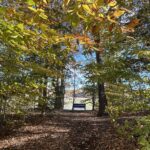

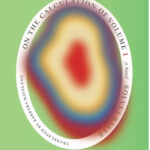
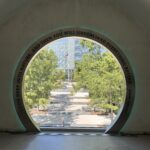

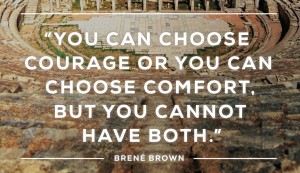
 D5 Creation
D5 Creation